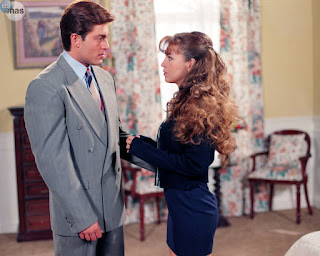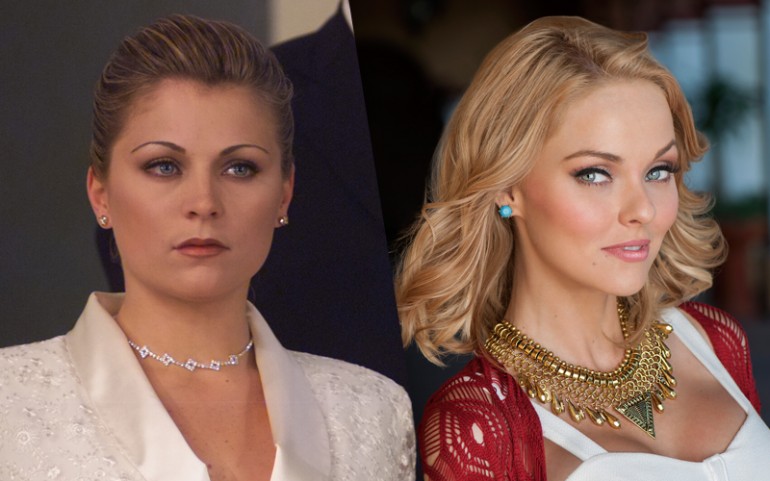LGBTQ (un)happy endings in A Favorita: Ultra-realism or the hand of patriarchy?
The Brazilian telenovela tradition is one of realism. Characters are often based on everyday people and storylines address current affairs. A Favorita is no exception. Besides being a trendsetter for the crime telenovela genre, it also foregrounds other issues such as prostitution, corruption and sexuality.
Two characters are written as representations sexual diversity: the wealthy athlete Orlandinho (Iran Malfitano) and the middle-aged restaurant owner Stella (Paula Burlamaqui). Both share a similar storyline: they are closetted and deal with unrequited love.
Stela is first introduced as new to Triunfo, a fictional country town, where she befriends Catarina, a victim of domestic violence. Introverted and mysterious, Stella helps Catarina find the strength to stand up to her husband. As a consequence, Catarina’s husband outs Stella in public during an argument. Humiliated, she leaves the scene – a decisive moment in which Catarina decides to divorce her husband. However, this brings Stella nowhere near her happy ending. Once outed, Stella confronts Catarina about their feelings for each other. Catarina reaffirms her heterosexuality and Stella decides to leave to cope with her unrequited feelings. She goes to Argentina and is not seen again.
Orlandinho’s story is one of the most controversial plot lines in the telenovela. Orlandinho (Iran Malfitano) is in love with Halley (Cauã Reymond), a hunk and a womanizer, and spends most of the story struggling to hide his sexuality from his family. He meets Maria do Céu (Deborah Secco), who is pregnant with Halley’s child and the couple makes a deal: they marry so that the child will not be brought up poor and Orlandinho will be able to keep his sexuality a secret. However, the couple falls in love.
While the decision appeased fans at the time, it seems to be based much more on critical reception than realism. At no point in the story is Orlandinho described as bisexual – he becomes straight out of love for a woman who is his partner in crime. Perhaps Carneiro’s approach was to please the fans – however, the controversial take lands on two very sensitive topics: gender stigma and the gay cure. There is a common saying by sexist men, particularly popular in Brazil: “Só é lésbica porque ainda não me beijou” (lit. She’s only a lesbian because she hasn’t kissed me yet). By changing Orlandinho’s sexuality because of one woman, the author fosters that idea while navigating a dangerous space between gender fluidity and the gay cure.
In 2022, Rede Globo opted for a re-run of A Favorita in the afternoon slot. Current media outlets have addressed how Orlandinho’s ending has not aged well. In the past four years, Brazil saw the rise of the extreme right in its political scenario. Bolsonaro’s 2018 political campaign consisted of a network of fake news which included the reinstatement of the gay cure (a psychological procedure aiming at turning gay people straight). While Orlandinho’s change pleased viewers in 2008, it carries a strong and dangerous message in 2022: one in which a gay author openly states that gay men can become straight for the right woman.
It is particularly complicated to tell what Carneiro’s intentions are when not allowing his two main LGBTQ characters to find their happy endings being themselves. In a way, it does portray the struggles of LGBTQ people in the 2000s Catholic, conservative Latin America. However, it does highlight Carneiro’s choice to not inspire others like himself.
To add another layer of complexity, Carneiro’s husband, Carmo Dalla Vecchia portrays Zé Bob in A Favorita. The character, a straight womanizer reporter who hates the rich, is slowly promoted to main character and ends up marrying Donatella, the female lead.
While Carneiro and his husband themselves are an inspirational story for gay men: both became celebrated actors and television writers, Carneiro’s characters come nowhere near a journey of acceptance. Like the fictional characters who cannot find their happy endings being themselves, Carmo Dalla Vecchia only gets his breakout role by portraying yet another straight man. As we consider Carneiro’s surroundings and writing choices, we are faced with the final questions: is he portraying LGBTQ drama based on reality, or is his writing being dictated by the invisible hand of patriarchy? Could a celebrated author nurture an unanalyzed prejudice against his own community? The story itself does not answer these questions, but it does make one wonder.





Comments
Post a Comment